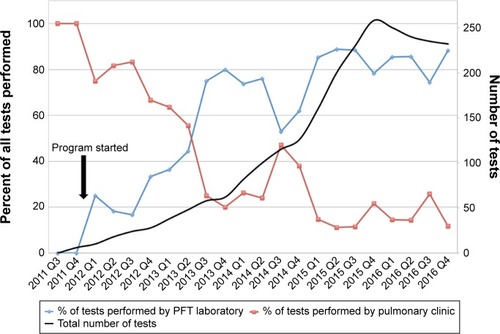Dear editor
Alpha-1 antitrypsin deficiency (AATD) is the only well-recognized genetic disorder associated with an increased risk of emphysema and COPD.Citation1 Identifying AATD allows genetic counseling and the chance to offer specific augmentation therapy to slow emphysema progression. Despite specific recommendations from the World Health Organization, American Thoracic Society and European Respiratory Society to screen all patients with COPD and other at-risk conditions,Citation2–Citation4 testing rates are low (<15%).Citation5
We conducted a project to improve AATD screening at the Miami VA Medical Center using the pulmonary function test (PFT) laboratory. We instructed the PFT personnel to perform reflex testing on all patients with pre-bronchodilator airflow obstruction (forced expiratory volume in 1 second/forced vital capacity <70%) and then evaluated if the screening was appropriate according to guidelines. Trained PFT personnel explained AATD disease to patients and provided them with an informational brochure. After obtaining verbal consent, AATD screening was performed using dried blood spot kits provided by the Alpha-1 Foundation as part of the Florida Screening Program (noncommercial).Citation6 The PFT lab director was the responsible physician of record, in charge of discussing positive results to patients and documenting results in the electronic medical record. The Miami Veterans Affairs Medical Center Institutional Review Board approved the protocol as a quality improvement project.
Since launching the program, testing rates in our center had a 15-fold increase from baseline. In 4 years, the PFT laboratory performed 78% of the 1,021 tests ordered in our institution, leading to a decrease in the number of tests done by the pulmonary clinic (). Review of the 799 cases tested by the PFT laboratory found that 671 (83%) had an appropriate clinical indication for screening according to guidelines.Citation3,Citation4 The remaining subjects tested had mostly asthma (9.6%), other reasons for airflow obstruction such as sarcoidosis (2.2%) or did not have airflow obstruction (5%). Importantly, the COPD patients tested by the PFT laboratory were more likely to be active smokers with significantly better lung function compared with those tested at the pulmonary clinic ().
Table 1 Characteristics of subjects with confirmed COPD tested at the PFT laboratory and pulmonary clinics
Figure 1 Trends in AATD screening tests performed at the PFT laboratory and pulmonary clinics at the Miami VA Medical Center.

Our experience highlights the importance of partnering with PFT laboratory personnel to improve AATD testing rates. Respiratory therapists are exposed to a higher number of pulmonary patients at risk for AATD than pulmonologists and can improve detection of affected individuals in the course of their routine practices.Citation7 Continued education efforts and focusing on testing subjects with persistent airflow obstruction after bronchodilator testing could further reduce unnecessary testing rates. We conclude that reflex AATD testing by PFT personnel is an effective way to comprehensively and appropriately test subjects at risk. Furthermore, this strategy appears to identify a population that is more amenable to benefit from detection at an earlier disease stage.
Disclosure
The authors report no conflicts of interest in this work.
References
- StollerJKAboussouanLSAlpha1-antitrypsin deficiencyLancet2005365947822252236
- No authors listedAlpha 1-antitrypsin deficiency: memorandum from a WHO meetingBull World Health Organ19977553974159447774
- American Thoracic Society/European Respiratory SocietyAmerican Thoracic Society/European Respiratory Society statement: standards for the diagnosis and management of individuals with alpha-1 antitrypsin deficiencyAm J Respir Crit Care Med2003168781890014522813
- SandhausRATurinoGBrantlyMLThe diagnosis and management of alpha-1 antitrypsin deficiency in the adultChronic Obstr Pulm Dis (Miami)201633668682
- StollerJKBrantlyMThe challenge of detecting alpha-1 antitrypsin deficiencyCOPD201310Suppl 1263423527684
- GorriniMFerrarottiILupiAValidation of a rapid, simple method to measure alpha1-antitrypsin in human dried blood spotsClin Chem200652589990116638961
- StollerJKStrangeCSchwarzLKallstromTJChatburnRLDetection of alpha-1 antitrypsin deficiency by respiratory therapists: experience with an educational programRespir Care201459566767224106322
